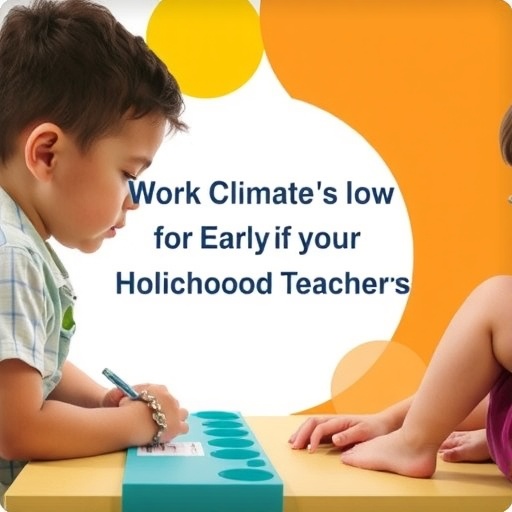In the bustling world of early childhood education, the intricate dynamics between teachers’ job demands and their interactions with children are becoming clearer, particularly as new research emerges shedding light on the underlying factors at play. A recent investigation conducted by Min, Cheng, and Kim delves deep into the nuances of these relationships, emphasizing the critical role that work climate plays in moderating the effects of job demands. The findings from this study are not just academic; they resonate with educators, policymakers, and communities involved in fostering healthy environments for young learners.
The research begins by establishing the context of early childhood education, a pivotal period in individuals’ development. The role of early childhood educators extends beyond mere instruction; they are tasked with shaping the emotional, social, and cognitive foundations of the children in their care. However, the demands placed on these professionals can be overwhelming, creating potential barriers to effective teaching and fostering meaningful relationships with students. In this sense, understanding the job demands that early childhood teachers face is essential.
One significant aspect of the study is the identification of various job demands that teachers encounter regularly. These demands range from administrative responsibilities and curriculum planning to emotional labor associated with nurturing and guiding young children. The burden of these tasks can inadvertently affect the quality of interpersonal relationships teachers develop with their students. When educators are overburdened, their capacity to engage meaningfully with children diminishes, leading to a ripple effect that can impact students’ learning experiences and emotional well-being.
Moreover, the research emphasizes that the work climate within educational institutions significantly influences how teachers manage these job demands. A positive work climate, characterized by supportive leadership, collaboration among staff, and availability of resources, can buffer the negative effects of job demands. In contrast, a toxic or unsupportive environment can exacerbate stress and burden, further straining the teacher-child relationship. The implications of these findings are profound, pointing toward the necessity for educational stakeholders to cultivate a nurturing and supportive work environment.
In assessing the data, Min and colleagues used a mixed-methods approach, combining quantitative surveys and qualitative interviews to gather a comprehensive view of teachers’ experiences. This methodology not only provided robust statistical insights but also highlighted the personal stories and challenges educators face daily. Through their narratives, the study paints a vivid picture of the emotional landscape surrounding early childhood education, emphasizing the importance of understanding individual experiences in the broader context of job demands and work climate.
The study also underscores the necessity of workforce development for educators in early childhood settings. As they navigate their demanding roles, teachers require training and professional development that not only enhance their instructional skills but also equip them with strategies to manage stress and maintain positive relationships with their students. This dual focus on educational practices and teacher wellness is vital for fostering an environment where both educators and children can thrive.
Amid these discussions, the role of leadership in shaping work climates cannot be overstated. School administrators play a crucial part in fostering supportive environments that empower teachers. Leadership strategies that prioritize open communication, provide regular feedback, and encourage professional development create a positive atmosphere that can significantly enhance teachers’ job satisfaction and overall well-being. When teachers feel valued and supported, they are more likely to build strong, trusting relationships with the children they serve.
The impact of a healthy work climate stretches beyond teacher satisfaction; it ultimately influences student outcomes. When educators operate in a supportive environment, they are better equipped to connect with their students emotionally and intellectually. This engagement not only aids in enhancing students’ learning experiences but also fosters a sense of belonging and security among children, which is critical during their formative years.
As the study unfolds, it also addresses the systemic changes necessary to support early childhood educators in managing their professional demands effectively. Educational systems must advocate for policies that prioritize mental health resources for teachers and implement structural changes that ease their workload. Such initiatives could include reducing class sizes, providing administrative support, and investing in comprehensive training programs aimed at emotional resilience and stress management.
Additionally, to create sustainable change, there should be a concerted effort to elevate the status of early childhood education within the broader educational framework. Recognizing and enhancing the professional identity of early childhood educators is paramount. This can be achieved through increased funding, public awareness campaigns, and advocacy efforts aimed at illustrating the vital role these educators play in shaping society’s future.
In conclusion, the research conducted by Min, Cheng, and Kim offers critical insights into the complex interplay between job demands, work climate, and teacher-child relationships in early childhood education. As these findings ripple through academic circles and educational policy discussions, there is hope for meaningful change that prioritizes the well-being of both educators and their students. The overarching message is clear: when we invest in the work climate of early childhood educators, we invest in the future of our children.
In an age where the importance of social and emotional learning has gained traction, the insights from this research call for immediate action. By fostering supportive work environments, providing adequate resources, and prioritizing the needs of educators, we can create a brighter future for early childhood education—one where teachers thrive, and by extension, so do the young minds they nurture.
Subject of Research: Early Childhood Teachers’ Job Demands and Relationships with Children
Article Title: Early Childhood Teachers’ Job Demands and Relationships with Children: The Moderating Role of Work Climate
Article References:
Min, J., Cheng, W., Kim, S.G. et al. Early Childhood Teachers’ Job Demands and Relationships with Children: The Moderating Role of Work Climate. Early Childhood Educ J (2025). https://doi.org/10.1007/s10643-025-01957-0
Image Credits: AI Generated
DOI:
Keywords: Early Childhood Education, Job Demands, Work Climate, Teacher-Child Relationships, Educational Leadership, Teacher Well-being.




